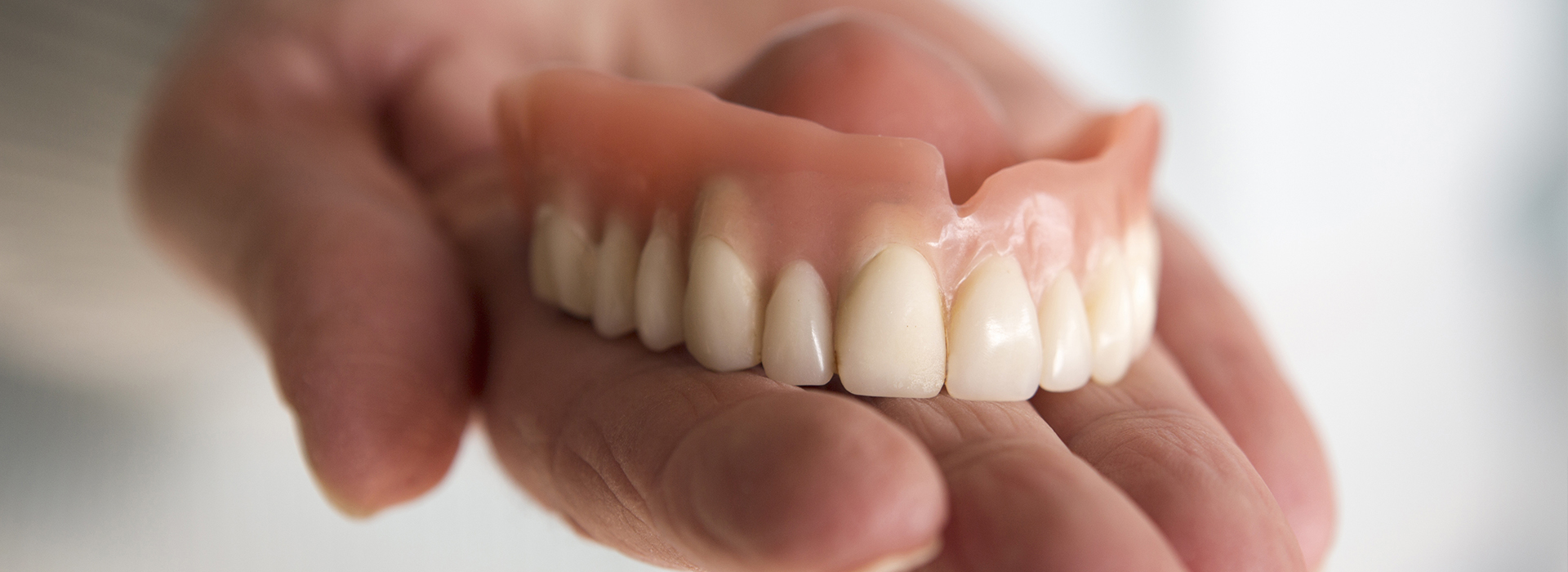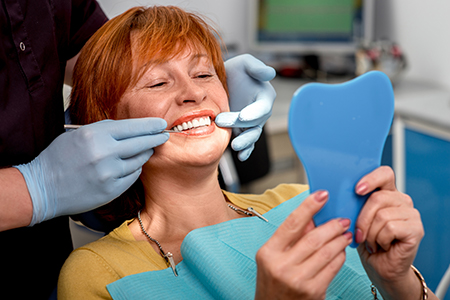
Modern materials and refined techniques make replacing missing teeth more natural and comfortable than ever. While fixed options such as dental implants and bridgework remain excellent choices for many patients, removable dentures continue to be a reliable pathway to restoring a complete, functional smile. They are versatile, proven, and tailored to meet a wide range of clinical and personal needs.
At Cosmetic Micro Dentistry, we craft dentures using high-quality materials combined with attention to fit, function, and facial aesthetics. Our approach balances technical precision with practical guidance so patients can regain confidence when speaking, eating, and smiling. We aim to make the process clear, predictable, and respectful of each patient’s goals.
Losing one or more teeth affects more than appearance; it changes how the mouth performs. Gaps alter the way your teeth meet, influence chewing efficiency, and can make certain foods difficult to enjoy. Over time, untreated tooth loss may lead to shifting of adjacent teeth, bite collapse, and uneven wear that complicate future care.
There are also broader health implications. Missing teeth can reduce the variety and quantity of nutrients you consume, which impacts overall wellness. Without the stimulation teeth provide, the underlying jawbone can gradually resorb, changing facial contours and making prosthetic replacement more complex later on.
Addressing tooth loss sooner helps preserve oral function and facial structure. Whether you are considering partial or complete dentures, thoughtful planning is central to achieving an outcome that looks natural, supports facial contours, and restores reliable everyday function.

Dentures are removable prosthetics that replace missing teeth and the supporting gum tissue. They consist of one or more lifelike artificial teeth set into a supportive base that rests on the gums. Properly made dentures restore bite relationships and help support the lips and cheeks, often improving overall facial balance.
Unlike fixed restorations, removable dentures can be taken out for cleaning, which simplifies hygiene around remaining natural teeth and the soft tissues. This removability also allows for periodic adjustments, relines, or repairs without invasive procedures, making dentures an adaptable long-term option for many patients.
Modern denture bases and tooth materials are designed to be both durable and natural in appearance. When combined with careful jaw records and skilled laboratory work, dentures provide a comfortable fit and predictable function for everyday activities like speaking and chewing.
Selecting a denture starts with a comprehensive evaluation: the condition of remaining teeth, the quantity and quality of the supporting bone and soft tissue, bite relationships, and the patient’s functional and aesthetic expectations. This assessment guides whether a partial or full denture is the best solution.
Partial dentures replace one or several missing teeth and typically rely on clasps or precision attachments to stabilize the appliance against adjacent natural teeth. They help maintain tooth alignment and restore chewing surfaces while being removable for cleaning and adjustments.
Full (complete) dentures replace an entire arch of teeth—either the upper, lower, or both. The decision to proceed with a complete denture may follow extractions or be planned when remaining teeth are not restorable. With careful planning, full dentures can deliver reliable function and a pleasing smile.
Complete denture care has evolved beyond a single method. Some patients benefit from a staged approach—allowing tissues to heal fully before fabricating a final prosthesis—while others prefer restorations placed immediately after extractions so they do not go without teeth during healing. Each approach has trade-offs that your clinician will explain based on your clinical situation.
Immediate Denture
An immediate denture is inserted at the same appointment as tooth removal so the patient does not experience an interim period without teeth. This approach offers immediate aesthetics and function but often requires subsequent adjustments or relines as healing changes the shape of the gums and underlying bone.
Overdenture
An overdenture is designed to gain added support from specially prepared natural tooth roots or from attachments that interface with implants. Retaining root structure—or using strategic attachments—can preserve bone and increase prosthesis stability while still allowing the appliance to be removed for hygiene.
Implant-Supported Dentures
Implant-supported dentures anchor to dental implants placed in the jaw, providing enhanced retention and comfort compared with traditional suction or adhesive-based retention. These solutions are especially helpful for lower-arch prostheses where stability can otherwise be a challenge.
Partial dentures can be constructed from a range of materials and frameworks. Contemporary designs emphasize lightweight frameworks, discreet clasps, and base materials that blend with oral tissues. The objective is to restore function while minimizing bulk and preserving remaining teeth.
When well designed, a partial denture not only fills the visual gap left by missing teeth—it also distributes biting forces and helps prevent the unwanted drifting of adjacent teeth that could complicate future dental care.
Our practice carefully evaluates the pros and cons of each partial design to recommend the option that best preserves long-term oral health and meets each patient’s functional needs.
At Cosmetic Micro Dentistry, our focus is on creating prostheses that fit comfortably and perform reliably. We collaborate with skilled dental laboratories, use precise jaw records, and select appropriate tooth shapes and shades so your restoration integrates seamlessly with your face and remaining dentition.

Successful dentures depend on a precise diagnosis and a sequence of carefully executed steps. We combine a thorough oral exam with diagnostic imaging and, when helpful, digital records to map the anatomy of the jaws and the position of any remaining teeth. This preparation reduces surprises and leads to a more predictable final fit.
Laboratory collaboration is equally important. Skilled technicians translate clinical records into prostheses with balanced occlusion, lifelike tooth arrangement, and comfortable tissue adaptation. When implant support is part of the plan, surgical and restorative teams coordinate placement and attachment selection for optimal stability.
Occasionally, pre-prosthetic procedures—such as smoothing bony prominences, performing minor soft-tissue adjustments, or extracting unrestorable teeth—improve the long-term fit and comfort of a denture. We review these options openly and recommend what best serves the prosthetic outcome.

When you first receive a denture, there is an adjustment period. Speaking and chewing may feel different for a little while as your oral muscles learn new patterns. Most patients find that regular wear, gentle practice reading aloud, and starting with softer foods help accelerate adaptation.
Proper daily care is essential. Rinse and brush the prosthesis after meals, soak it nightly in water or a recommended cleanser, and clean any remaining teeth and gums thoroughly. Removing the denture at night gives tissues a rest and reduces the risk of irritation or infection.
Follow-up visits are an integral part of success. Routine checkups let us monitor fit, make timely relines or adjustments as tissues change, and evaluate the health of any remaining teeth and the supporting bone. With attentive care, a well-made denture can provide years of dependable service.
We invite you to learn more about how dentures might restore comfort, function, and a natural-looking smile. Contact our office to discuss your situation and explore the restorative paths available — we’re here to answer your questions and help you make an informed decision.
Today, it’s easier than ever to replace missing teeth and achieve natural-looking, durable, and long-lasting results! Depending on a patient’s dental needs, lifestyle, expectations of care, and budget, choices can include conventional fixed bridgework, dental implants, or removable partial and complete dentures. At the office of Cosmetic Micro Dentistry, we’ll discuss all your options in care and answer all your questions as you choose the solution that’s right for you.
With advances in dental materials and technology, today’s dentures are more comfortable and realistic-looking than ever before.
Whether you wear partial or complete dentures, it’s essential to see the dentist for routine care. Besides checking the fit and condition of your dentures and making any necessary adjustments, you’ll also receive a comprehensive exam to check on the health of any remaining teeth as well as the soft and hard tissues in and around the oral cavity.
A same-day denture offers an accelerated design and fabrication process that allows a patient to go from impression taking to denture insertion in a single day.
For patients who don’t want to wait after having teeth extracted, an immediate denture can be inserted the same day your teeth are removed. Sometime later you may need the denture relined to address any changes in its fit once the extraction sites have completely healed.
While no one wants to drop or break a partial or complete denture, accidents do happen. The good news is that in some cases, your partial or complete denture is reparable. It all depends on the extent of the damage. Don’t hesitate to contact our office if you’ve broken or damaged your denture. We’re happy to help.
The simple act of taking your partial denture in and out can cause certain types of metal clasps to loosen over time. When you come in for your checkup visit or contact our office for an adjustment, we’ll assess the fit of your partial and tighten the clasps for improved stability and comfort.
While rebuilding a complete smile is a worthwhile investment, our office is sensitive to the costs involved in dental care. We customize care and will discuss which treatment options address your needs, lifestyle, and budget. How much a new denture will cost depends on the type of the prosthesis, its design, and the materials used to fabricate the supportive base, teeth, and clasps or precision attachments. Dentures that include the placement of dental implants for added retention and stability typically involve additional costs.
If you have dental insurance, your coverage may include a new or replacement set of dentures. Our staff is happy to review your coverage with you to ensure you are maximizing your insurance benefits while minimizing any out of pocket expenses.
At the office of Cosmetic Micro Dentistry, we provide an extensive range of dental services, including the latest and most effective methods to help patients with missing teeth rebuild complete and beautiful smiles. As skilled and experienced professionals, we recognize that every patient is different, and every smile is unique. We’re passionate about what we do and take great pride in providing personalized treatment plans while treating our patients as valued partners in care.
Dentures are removable prosthetic devices that replace missing teeth and the surrounding gum tissue. They consist of artificial teeth set in a base that is designed to rest on the gums and underlying bone, restoring the appearance and function of a natural dentition. Proper fit and accurate fabrication allow dentures to support speech, chewing and facial contours by reestablishing the vertical dimension and tooth relationships.
Retention and stability depend on the type of denture and the condition of the tissues that support it; some dentures rely on suction and close adaptation to the gums while others use clasps, precision attachments, or implants for additional support. Because dentures are removable, they can be taken out for daily cleaning and overnight rest, which helps preserve the health of the oral tissues. Routine adjustments and professional follow-up ensure continued comfort and function as tissues remodel over time.
The two primary categories of removable dentures are full (complete) dentures and partial dentures. Full dentures replace all teeth in the upper or lower arch when no natural teeth remain, while partial dentures fill gaps when some healthy teeth are still present and help prevent unwanted tooth movement.
Within these categories there are variations such as immediate dentures placed at the time of extractions, overdentures that gain support from remaining teeth or attachments, and frameworks made from cast metal, flexible resins, or hybrid materials. The choice of design and material is determined by oral health, the number and position of remaining teeth, esthetic goals, and functional requirements assessed during the treatment planning process.
Implant-supported dentures attach to dental implants that are surgically placed in the jawbone, providing fixed points of support that greatly increase stability and retention. This anchorage reduces movement during chewing and speaking, improves comfort, and can improve the ability to eat a wider variety of foods compared with a conventional denture that rests solely on the gums.
Beyond improved function, implants help preserve jawbone by transmitting chewing forces to the bone and slowing resorption. Implant-supported options vary from removable overdentures that latch onto attachments to fixed hybrid prostheses, and the appropriate solution depends on bone volume, patient health, and treatment goals determined during comprehensive evaluation.
An immediate denture is fabricated in advance and inserted immediately after tooth extractions so the patient does not remain without teeth during the healing period. This approach preserves appearance and basic function right after surgery and can be a good option for patients who prefer to avoid a period without teeth.
Because tissues change as they heal and remodel, immediate dentures often require one or more relines or adjustments to maintain an optimal fit. During follow-up visits clinicians evaluate healing, make necessary modifications, and determine whether a conventional denture should be fabricated later for the best long-term fit.
Daily care is essential for the health of your dentures and the tissues they contact. Rinse dentures after meals to remove food debris, brush them gently with a soft denture brush and mild cleanser, and soak them overnight in water or a recommended denture solution to maintain shape and cleanliness.
In addition to cleaning the prosthesis, brush any remaining natural teeth, gums, tongue and palate to remove plaque and stimulate circulation in the soft tissues. Bring your dentures to regular dental visits for professional cleaning, fit checks, and any needed adjustments to prevent irritation or tissue changes.
Adjustment times vary, but most patients adapt to new dentures over several days to a few weeks. Early changes often include increased saliva production, mild soreness, and temporary speech differences as the tongue and lips learn new positions.
Practicing speech by reading aloud, beginning with soft foods and cutting food into smaller pieces, and attending scheduled adjustment appointments helps accelerate adaptation. If persistent discomfort or functional issues occur, follow-up care can correct pressure points and improve fit for a more comfortable experience.
At Cosmetic Micro Dentistry we begin with a thorough oral examination, medical history review and appropriate imaging to evaluate bone, soft tissues, and remaining teeth. Digital impressions, intraoral scans and careful bite records are used to create a custom treatment plan and precise laboratory instructions so the denture supports proper function and natural aesthetics.
The fitting process typically includes try-ins to confirm tooth position, shade and bite, followed by final adjustments at insertion and short-term follow-up visits. Ongoing maintenance, professional relines and periodic examinations are scheduled to preserve function and comfort as oral tissues change over time.
Yes—well-designed dentures restore the missing tooth surfaces and support the lips and cheeks, which can improve facial fullness, reduce the appearance of sagging, and restore a natural smile. Reestablishing proper tooth relationships and vertical height helps improve chewing efficiency and enhances the clarity of speech by providing necessary tooth contacts for sounds.
The degree of improvement depends on the denture design and how well it fits; patients with implant-supported dentures often experience greater stability and function. Regular adjustments, patient training in chewing strategies and collaboration with the dental team optimize outcomes for comfort, function and appearance.
Relines are recommended when the supporting tissues change shape due to bone resorption or tissue remodeling, which can cause looseness or discomfort. Repairs may be needed if a denture fractures, a tooth becomes loose or an attachment wears out; timely repairs prevent further damage and restore function.
Complete replacement is considered when a denture is severely worn, cannot be adapted to the changing oral anatomy, or when esthetic and functional goals have evolved. Regular dental checkups allow clinicians to monitor fit and function and recommend relines, repairs or remakes at the appropriate time.
A good candidate for dentures is someone whose remaining teeth and oral tissues can support a removable prosthesis or who is willing to consider adjunctive options such as implant attachments for added stability. An initial consultation includes a medical and dental history review, oral examination, imaging as needed, and a discussion of functional and esthetic goals to determine the most suitable approach.
The treatment pathway commonly involves tooth extractions when necessary, impressions or digital scans, bite registration, try-ins for esthetics and occlusion, final insertion and a series of follow-up visits for adjustments. Throughout the process the dental team provides instructions on care, expected adaptation, and long-term maintenance to help patients achieve predictable, comfortable results.
Quick Links
Contact Us